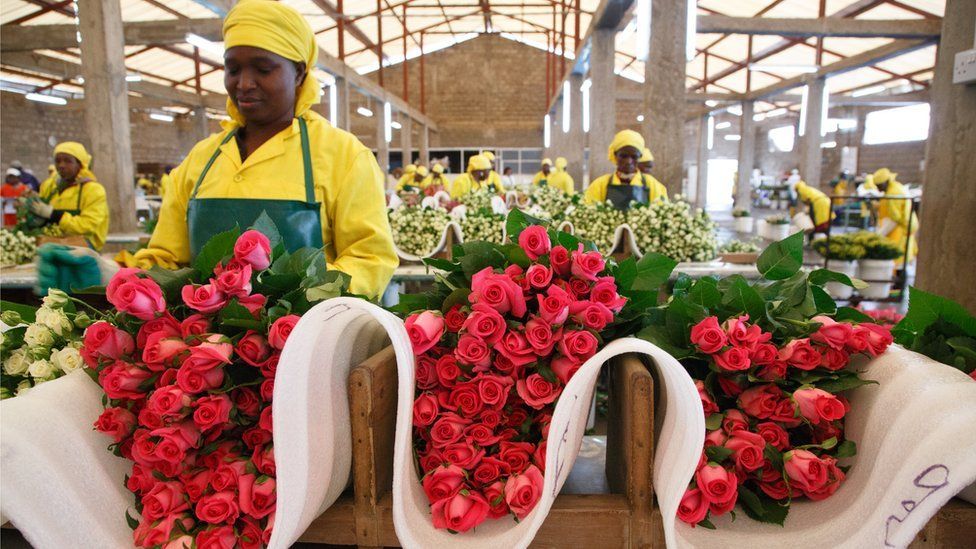No bed of roses: The Kenyan flower pickers fighting sexual harassment
- Published

Female flower pickers in Kenya can face many hardships in their work - often finding themselves victims of sexual harassment or earning a wage so low they struggle to get by - but initiatives are in place to try to improve the workers' rights.
As Julia prepares for the start of the working week, a discarded pile of jumpers and jeans are flung from a wire rack on to a sunken mattress on the floor. She has a busy day ahead, picking roses on the local flower farm, and she wants to impress her new manager.
"It was an opportunity I couldn't refuse," she explains, ushering the youngest of her five children out the door. "Regular work, a school nearby and a new home. Here in rural Kenya, there isn't anything else for women like me."
Glancing out of the window of the minibus as it skirts around the shores of serene Lake Naivasha, 100km (62 miles) north of Nairobi, she points out the rays of sun bouncing off calm waters. It's easy to see why families flock here during the harvesting season.
But beyond the vibrant fields of freshly cut roses and chrysanthemums, it's claimed that workers' rights are being exploited on an industrial scale, with allegations of low pay, unfair dismissals and sexual harassment of the predominantly female workforce.
"Men complain that when we wear skirts, they feel like having sex with us. We have to be careful," says Julia. "That's why it's important that I am dressed appropriately."
Building confidence
Julia, who does not want to give her last name, recently left a role on a farm nearby after she refused to have sex with her male supervisor. She is hopeful that her new job on a farm certified by Fairtrade International will offer more protection.
Aware of the frequency of incidents of sexual assault, Fairtrade has set up a gender committee on each of its 39 flower farms in Kenya, which encourages women to report violations.
Tsitsi Choruma, global gender adviser and chief operating officer for Fairtrade Africa, believes these structures are necessary to ensure harassment is reported.
"We need to build confidence - the softer skills mean these women are able to talk. We must build the power within them. We also need to involve men to enhance equality and empowerment."
But for the remaining 60% of flower farms in Kenya that do not have the Fairtrade reporting structures in place, holding perpetrators to account is complex.
'Living in fear'
Andrew Odete, regional project manager at Hivos International, a Kenyan human rights organisation, says that more needs to be done to address the sexual harassment of female staff.
"Many women live in fear of losing their marriages if they are accused of being complicit in that act. Because of power relations, if it is the director or the manager accused of a violation, the choice as to who must leave is an easy one for many farms."
Low pay is also rife across the horticulture sector in Kenya. On average, a harvester earns between $60 to $120 per month, falling far below what workers require to sustain themselves.
At a farm on the southern shores of Lake Naivasha, flower harvester Daisy shuffles languidly towards the bus stop at the end of her shift. She says that she is concerned her salary is not enough to support her family.
"I earn around $50 per month. That money is too small. It's not enough to feed myself and it's much too little to provide food for my children."
While discussions about a minimum wage are continuing within the horticulture sector, Stephen Oburo from the Federation of Kenyan Employers, an affiliate of Kenya's Labour Ministry, claims that the onus should be shifted to employees rather than employers in order to exercise fair workers' rights.
"If these women can't even inform union leaders or the Ministry of Labour about their wages, they are doing a disservice to themselves and this country," he states. "Do they want us to put a policeman on each farm to make sure these violations don't happen? We don't have the resources to do that."
New solutions
For many flower harvesters, safeguarding their rights is primarily managed by trade unions and local non-governmental organisations (NGOs).
Jane Ngige, chief executive of the Kenya Flower Council, says that supporting farms to come up with innovative answers to old problems will be the next step forward.
"When women get their wages, they lose their money to thieves. They are often attacked on the way home, or their husbands find 'better ways' for them to use that money. In response, the farms installed ATMs. These women are now running bank accounts and you cannot imagine what an impact that has had on these workers."
The role that consumers in Europe play can also make an impact, Andrew Odete from Hivos says.
"We have found that there is a willingness by the consumer to pay 35 euro cents (30p) per bouquet of flowers in order that that money comes back upstream and translates into a liveable wage for a worker on the farms of Lake Naivasha."
But for women like Daisy without the reporting structures in place to address violations of workers' rights, she hopes that this role will be a short-term fix.
"When I get a better job, I will go. I don't mind where. Anywhere would be better than here."
- Published4 July 2023
- Published19 September 2014